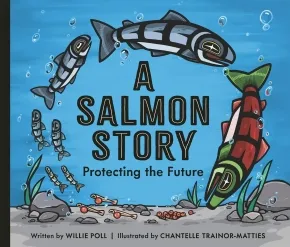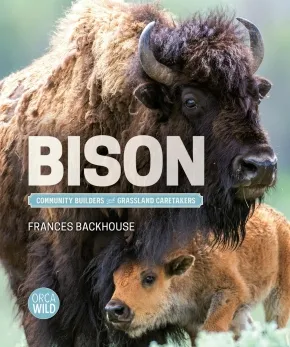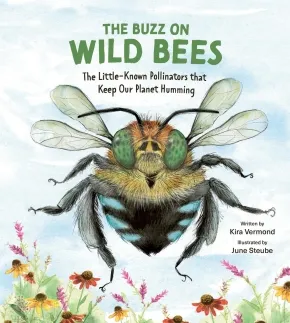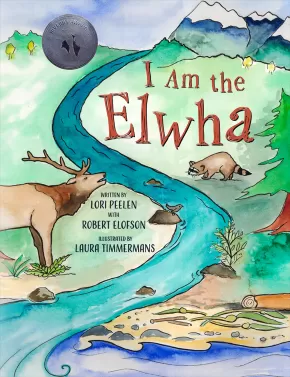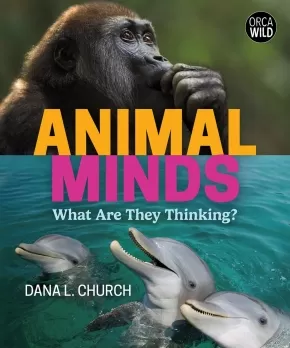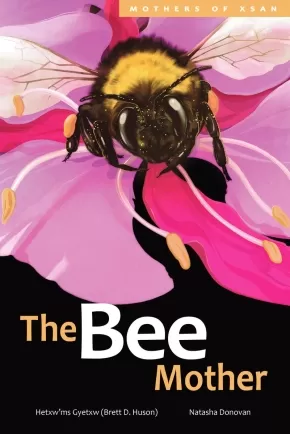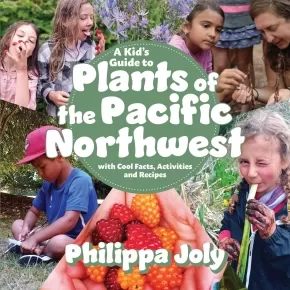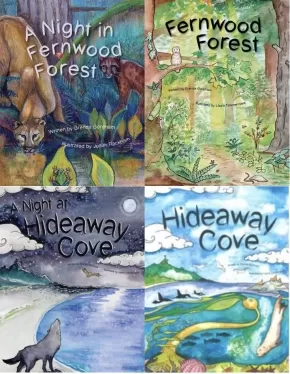
Ecosystem
1
-
15
of
93 Results;
Sort By
Go To
of 7
The Cedar Mother
$24.95
Artists:
Format:
Hardcover
Text Content Territories:
Indigenous Canadian; First Nations; Gitxsan (Gitksan);
ISBN / Barcode: 9781774921586
Synopsis:
Synopsis:
From small sapling to towering giant, follow the long life of a cedar tree in this illustrated book for young scientists.
Step outside to explore the hidden mysteries of the cedar tree life cycle in this beautifully illustrated, engaging non-fiction book for young scientists ages 9 to 12.
Meet Nox Sim Gan, the cedar mother, whose life cycle spans centuries and whose roots anchor the landscape. The cedar mother plays a vital role in the ecosystem: offering shelter for birds in her strong limbs, providing refuge for small creatures beneath her bark, and healing the Gitxsan with a medicinal tea made from her soft, green leaves. She also creates the very oxygen that all land-dwelling creatures need to breathe.
Delve into the remarkable story of the western red cedar as you learn how she nourishes herself through an unexpected connection to salmon, the secret web of life that thrives beneath the ground, and how, at the end of her life, she leaves a final gift for the Gitxsan. This book invites young readers to discover the life of a tree that is much more than meets the eye, offering lessons in interconnectedness, and in wisdom passed down through generations.
Educator & Series Information
Recommended for ages 9 to 12.
Lexile measure: 1050L
This book is part of the Mother of Xsan series, which uses striking illustration and lyrical language to bring the poetry of the Xsan ecosystem to life. It is the eighth book in the series.
Additional Information
32 pages | 6.50" x 10.00" | Hardcover
A Kid's Guide to Plants of the Great Lakes Region: Including Southern Ontario with Cool Facts, Activities and Recipes
$26.95
Format:
Paperback
Text Content Territories:
Indigenous Canadian;
ISBN / Barcode: 9781998526109
Synopsis:
Synopsis:
A middle-grade-friendly introduction to flora of the Great Lakes Region, with outdoor activities, games and quizzes that make learning about nature fun! Great for families and educators.
Get dirty digging up roots. Crouch down to look closely at a carnivorous sundew dissolving a dragonfly. Make an elderberry concoction. Test your plant ID skills with a winter twig quiz. Make a soothing plantain salve to treat an itch. Learn which berries you can eat and which to avoid.
Time spent outdoors encourages children’s self-confidence and independence, increases attention span and physical well-being, and fosters care for the environment. With the increasing intrusion of technology into daily life, and the challenges of climate chaos, it has never been more essential for parents and educators to encourage kids to engage with the natural environment. Plants are everywhere, even in urban areas where parks, empty lots and backyards offer the opportunity to learn from and connect to nature.
Drawing on their years of experience as outdoor educators, co-authors Philippa Joly and Danielle Gehl Hagel feature fifty richly illustrated plant profiles, including information on identification and ecology, cultural uses, and fun activities—all in a way that is accessible and interesting to readers of all ages.
Educator Information
Juvenile Nonfiction.
Additional Information
224 pages | 8.50" x 8.50" | Paperback
A Salmon Story: Protecting the Future
$22.95
Artists:
Format:
Hardcover
Text Content Territories:
Indigenous Canadian; First Nations; Salish; Interior Salish; St'at'imc (Lillooet, Lil'Wat);
ISBN / Barcode: 9781771476461
Synopsis:
Synopsis:
A lyrical informational picture book about how open-net pen fish farms impact wild salmon and their ecosystems
Salmon are central to their ecosystem and the lives of many Indigenous Nations, but the rapid rise of open net-pen fish farming has threatened these longstanding connections. Salmon have followed the same migration routes for thousands of years, but the fish farming industry has had a deadly impact on their annual journey. Open-net pen farms release harmful waste into the ocean that is lethal to the wild salmon forced to swim through it. Now, the salmon must battle against the human-made destruction of their habitat, and many Nations are advocating for change and creating calls of action to protect salmon for future generations.
As the young salmon journey from their gravel nests to the open ocean, readers learn about the life cycle of wild salmon, the effects of open-net pen fish farms, and the role of salmon as a keystone species.
Boldly illustrated with gorgeous Northwest Coast formline art, rhythmic poetry combines with supportive nonfiction content to illuminate the struggles faced by wild salmon populations.
Educator Information
Recommended for ages 5 to 8.
Fountas & Pinnell Text Level Gradient: J
Lexile measure: 980L
Additional Information
40 pages | 10.00" x 8.50" | Hardcover
Bison: Community Builders and Grassland Caretakers
$24.95
Format:
Hardcover
Text Content Territories:
Indigenous American; Indigenous Canadian; First Nations; Assiniboine (Nakoda Oyadebi); Carry The Kettle Nakoda First Nation; Métis;
ISBN / Barcode: 9781459839236
Synopsis:
Synopsis:
Bison are North America’s largest land animals.
Some 170,000 wood bison once roamed northern regions, while at least 30 million plains bison trekked across the rest of the continent. Almost driven to extinction in the 1800s by decades of slaughter and hunting, this ecological and cultural keystone species supports biodiversity and strengthens the ecosystems around it. Bison: Community Builders and Grassland Caretakers celebrates the traditions and teachings of Indigenous Peoples and looks at how bison lovers of all backgrounds came together to save these iconic animals. Learn about the places where bison are regaining a hoof-hold and meet some of the young people who are welcoming bison back home.
Educator & Series Information
Recommended for ages 9 to 12.
This book is part of the Orca Wild series that examines the intricacies of animals, ecosystems, humans and our relationships to each other.
This STEAM title examines the biology and habitat of bison, their role as a keystone species, their importance to Indigenous cultures, conservation efforts, and how kids can take action to protect bison in the future.
Reading Levels:
Fountas & Pinnell Text Level Gradient: W
Lexile measure: 1020L
Guided Reading Level: W
Contains some Indigenous content, such as a contribution from Kaleya Blackbird Runns from the Carry the Kettle Nakoda Nation in Saskatchewan, as well as information on the bison's importance to many Indigenous cultures in North America.
Additional Information
96 pages | 7.50" x 9.00" | 96 colour photographs, 2 maps, 1 index, 1 bibliography | Hardcover
The Buzz on Wild Bees: The Little-Known Pollinators that Keep Our Planet Humming
$22.95
Artists:
Format:
Hardcover
ISBN / Barcode: 9781771476171
Synopsis:
Synopsis:
An engaging introduction to the wide world of wild bees
Say the word "bee," and most kids think of honeybees or bumblebees. But there are around 20,000 discovered species of bees-and most of these are wild, solitary bees that don't live in hives. Readers will discover fascinating facts about these lesser-known bee species, from mason bees and mining bees to leafcutter bees and vulture bees.
Using clear, concise language and plenty of fun word play, this introduction to wild bees describes their life cycles, habitats, and behaviors ... some of which are weirder than others! It also explains the importance of wild solitary bees to many ecosystems, the challenges these bees face, and the things we can do to be part of the solution.
Vibrant, detailed illustrations created with pencil, crayon, and watercolor provide close-up views that are buzzing with life. Full of fun facts, The Buzz on Wild Bees invites readers to celebrate and protect all the world's bees.
Educator Information
Recommended for ages 7 to 10.
Additional Information
40 pages | 8.50" x 9.50" | Hardcover
When a Tree Falls: Nurse Logs and Their Incredible Forest Power
$28.99
Artists:
Format:
Hardcover
ISBN / Barcode: 9781797218670
Synopsis:
Synopsis:
The perfect read for exploring nature with children, this beautiful nonfiction picture book offers an awe-inspiring look at the forest’s life cycle.
A tree suns and sways in the forest. She is a place to grow, to rest, and to shelter. But what happens when a tree falls? The answer will make your heart soar. In this lyrical picture book, explore how the extraordinary nurse log provides a nutrient-rich space for new seedlings, shelters small animals, hosts different plant species, and, most profoundly, nurtures a new tree in the process, renewing the cycle of life. Young readers will be amazed by the nurse log’s resilience and its powerful connection to the forest’s past, present, and future.
Perfect for:
- Kids who are interested in trees and forests
- Parents and grandparents of children who want to learn more about trees and forests
- Teachers, educators, and librarians seeking beautiful nonfiction books with STEM content
- Gift-givers looking for a distinctive present for an animal- or nature-loving child
- Anyone seeking a picture book that promotes environmental awareness
Educator Information
Recommended for ages 6 to 9.
Every organism in the forest ecosystem is connected. This fascinating picture book powerfully illustrates how the end of one life in the forest can be the beginning of another.
When a Tree Falls is a reminder of the wondrous ecosystems in our own backyards and the wild forest beauty we may discover by looking closely. It is ideal for families who enjoy being in nature.
The forest life is rendered with such richness and detail that it invites readers to immerse themselves in the endlessly inspiring natural world.
An excellent choice for a classroom book or as a gift for kids who love trees, spending time outdoors, and are mindful of environmental issues.
Additional Informationb
FLASH SALE! I Am the Elwha (PB)
 $11.22 $14.95
$11.22 $14.95

Artists:
Format:
Paperback
Text Content Territories:
Indigenous American; Native American; Salish; Coast Salish; Klallam (Clallam); Lower Elwha Klallam Tribe;
ISBN / Barcode: 9781771746311
Synopsis:
Synopsis:
"I am the Elwha, rushing down to the sea. I am the Elwha, wild and free."
The Elwha River flows 72km (45 miles) from its source in the Olympic Mountains to the Strait of Juan de Fuca in the Pacific Northwest. Uniquely, it hosts all six salmon species (Pink, Chinook, Coho, Sockeye, Steelhead, and Chum) as well as several species of trout.
In 1911, two dams were built on the river. The dams blocked the migration routes of the salmon and dramatically altered the entire river ecosystem for 100 years. In 2012, the dams were decommissioned and the world's largest dam removal and habitat restoration project began. In this lyrical and beautifully illustrated book, the author chronicles the history of the Elwha.
Narrated by the powerful voices of plants and animals that inhabit the river ecosystem, the dam builder, a worker, members of the Klallam Tribe, and the river itself, this story celebrates the ongoing rewilding of this special environment and offers a welcome to all the creatures who are coming home.
To learn more visit: www.elwha.org
Awards
- 2021 Riverby Award for Young Readers
Reviews
“I Am the Elwha is a powerful read about a powerful river and those who value and protect it." – Raina Delisle, Hakai Magazine
Educator Information
Recommended for grades 3 to 7.
At the back of the book are three pages of cultural, scientific, and historical information that discuss the following:
- the importance and symbolism of salmon to the Lower Elwha Klallam Tribe and other Coastal Salish Tribes
- facts about the six species of salmon found in the Elwha River (Chinook, Pink, Chum, Sockeye, Coho, and Steelhead)
- the history of the Elwha River and its status today
Keywords / Subjects: The Elwha River, Rivers, Dams, History, Environmental Awareness, Lower Elwha Klallam Tribe, Coast Salish, Native American, Culture, Washington, Animals, Salmon, First Salmon Ceremony, Plants, Nature, Settlers, Social Responsibility, Environmental Activism, Poetry.
Additional Information
32 Pages | 8.5" x 11" | ISBN: 9781771746311 | Second Edition | Paperback
Authenticity Note: This lyrical story, which chronicles the history of the Elwha River, is written by Lori Peelen. Robert Elofson, Tribal Elder and Harvest Manager in the Natural Resources Department for the Lower Elwha Klallam Tribes, approved Lori's work and contributed pages of back matter at the end of the work. Lori's story was further approved by Frances Charles, the Tribal Councilwoman for the Lower Elwha Klallam Tribe, after the entire council read and approved it.
The Canadian Content label has been applied because the illustrator of this work is Canadian.
Animal Minds: What Are They Thinking?
$24.95
Format:
Hardcover
ISBN / Barcode: 9781459834156
Synopsis:
Synopsis:
A deep dive into the minds of animals and how they think.
Wouldn't it be amazing to see inside the mind of a lion, a gorilla, an octopus or even a bee? In Animal Minds: What Are They Thinking?, author Dana L. Church looks at how scientists are doing just that. Their research shows that a wide variety of species have unique personalities, impressive memories, counting abilities, and incredible problem-solving skills.
Meet the scientists who study the minds of animals, discover the similarities and differences between the minds of different species and learn how they compare to our own. From dolphins to dung beetles, tigers to turkey vultures, Animal Minds shows that we are only beginning to scratch the surface when it comes to revealing the amazing inner worlds of the thousands of different creatures with whom we share this planet.
Reviews
“The book includes questions and answers with women scientists in the field, sidebars, and eye-catching full-page color photos. A good starting book on animal cognition for any young animal lover who has wondered if animals are more like humans than we think.”— Booklist
“Full-colour photos and illustrations are well-chosen and positioned to enhance understanding…Young readers…will find Animal Minds: What Are They Thinking? intriguing. It might help fill [a] knowledge gap and offer inspiration for further investigation. Highly recommended.”— CM: Canadian Review of Materials
Educator & Series Information
Recommended for ages 9 to 12.
This book is part of the Orca Wild series that examines the intricacies of animals, ecosystems, humans and our relationships to each other.
Additional Information
96 pages | 7.50" x 9.00" | Hardcover
The Bee Mother
$24.95
Artists:
Format:
Hardcover
Text Content Territories:
Indigenous Canadian; First Nations; Gitxsan (Gitksan);
ISBN / Barcode: 9781774920800
Synopsis:
Synopsis:
Discover the important role of bumblebees, honeybees, and wasps as pollinators in this colourful picture book for young scientists.
Learn about the life cycles of different kinds of bees in this enlightening picture book.
As flowers and trees begin to bud and bloom, Nox Ap, the bee mother, emerges from her winter sleep. To the Gitxsan, she is nature’s gardener. Without her hard work as a pollinator, we could not enjoy the fruits of strawberries and huckleberries. Follow her life from the first thaw of spring to the end of autumn.
In the seventh book of Hetxw'ms Gyetxw (Brett D. Huson)’s Mothers of Xsan series, readers will discover the important role of the bumblebee, the honeybee, and the yellow jacket wasp in the Xsan ecosystem.
Reviews
“Described with delicious adjectives (“pillowy moss floor”) that enrich the story...lushly colored and detailed; the fur on the bumblebee looks ready to be brushed. This great blend of nonfiction with narrative and amazing illustrations will engage readers in the life of bees and their significance to the Gitxsan Nation. A solid general purchase.” — School Library Journal
"A valuable addition to any school library, this book is ideal for grade 2 to 6 lessons about life cycles, biodiversity, biomes, and First Peoples Knowledge of sustainability and stewardship." - Melanie M., Elementary School Teacher, Indigenous Books for Schools
Educator & Series Information
Recommended for ages 9 to 12.
This book is part of the Mother of Xsan series, which uses striking illustration and lyrical language to bring the poetry of the Xsan ecosystem to life. It is the seventh book in the series.
Reading Level: Fountas & Pinnell T
Lexile® Framework for Reading: 1140L
This book is included in the Indigenous Books for Schools database from the Association of Book Publishers of BC. It is recommended for Grades 2 to 6 for English Language Arts and Science.
Themes: Animals, Land, Language, Sustainability, Life Cycles, Biodiversity, Interdependence, Seasons
Additional Information
32 pages | 6.50" x 10.00" | Hardcover
A Kid's Guide to Plants of the Pacific Northwest: with Cool Facts, Activities and Recipes
$26.95
Format:
Paperback
Text Content Territories:
Indigenous American; Alaska Native; Native American; Indigenous Canadian; First Nations;
ISBN / Barcode: 9781990776212
Synopsis:
Synopsis:
A middle-grade-friendly introduction to Pacific Northwest flora, with outdoor activities, games and quizzes that make learning about nature fun! Great for families and educators.
Get dirty digging up roots. Crouch down to look closely at a carnivorous sundew dissolving a dragonfly. Munch some lemony-tasting miner’s lettuce. Go on a scavenger hunt for some of nature’s more surprising creations, like the arbutus tree, a sculpture of living copper. Make a soothing plantain salve to treat an itch. Learn which berries you can eat and which to avoid.
Time spent outdoors encourages children’s self-confidence and independence, increases attention span and physical well-being, and fosters care for the environment. With the increasing intrusion of technology into daily life, and the challenges of climate chaos, it has never been more essential for parents and educators to encourage kids to engage with the natural environment. Plants are everywhere, even in urban areas where parks, empty lots and backyards offer the opportunity to learn from and connect to nature.
Drawing on her years of experience as a herbalist and outdoor educator, author Philippa Joly features more than fifty richly illustrated plant profiles, including information on identification and ecology, uses in Coastal Indigenous cultures, and fun activities—all in a way that is accessible and interesting to readers of all ages.
Reviews
“This is an absolutely delightful book, dedicated to helping children and youth build relationships with the plants in their world. It is a rich compendium of plant portraits and descriptions, personal stories, recipes, games and hands-on activities—like making tea from Yerba Buena or making a root-digging stick of Oceanspray. Philippa’s obvious love of kids, plants and the natural world shines through—and it is catching!” — Nancy Turner, Professor Emeritus, University of Victoria, and author of Plants of Haida Gwaii
Educator Information
Recommended for ages 6 to 12.
Table of Contents
1. Indigenous Peoples of the Pacific Northwest Coast
2. Regions and Plants Covered by This Book
3. Plant Names and Language
4. Dos and Dont's of Wildcrafting Plants
5. Understanding Plant Families
6. Plant Guilds
7. Poisonous Plants
8. Invasive Plants
9. Plant Profiles
10. For Parents and Educators
Additional Information
232 pages | 8.50" x 8.50" | Paperback
A Night in Fernwood Forest
 $21.95
$21.95

Artists:
Format:
Hardcover
ISBN / Barcode: 9781771746021
Synopsis:
Synopsis:
Come with us for a walk along a secluded forest trail on a quiet night in May. We catch glimpses of ten animals as they move about in their woodland home from dusk until dawn. A mother cougar and her cub, a colony of bats, and a family of shrews are among the nighttime creatures we encounter. Beautiful full-page illustrations also depict many plants that live in this ecosystem. Information at the back of the book provides facts about nurse logs and the Pacific Northwest temperate rainforest.
A Night in Fernwood Forest is part of the By Day and By Night Nature Series. Books in this series focus on a specific habitat and explore the many connections within a healthy ecosystem. Through lyrical stories, supportive illustrations, labelled diagrams, and nature notes, readers learn about living and non-living parts of the ecosystem.
Additionally, readers can:
- use a picture clue on each page to predict the animal featured on the next page
- count animals as their numbers increase in each illustration
- search for an animal that travels from page to page
- discover patterns in the text and structure of each book
- track the movement of the sun or moon across the sky
Reviews
"Brenda Boreham brings her teaching experience and love of nature to these books, filling them with opportunities for the discovery of interactions between plants and animals in healthy ecosystems…. This beautiful book will engage listeners and independent readers and support the science goals in elementary school classrooms." – Canadian Teacher Magazine, Winter 2024 issue
Educator & Series Information
Recommended for kindergarten to grade 4.
This is a fictional story with factual information about the Pacific Northwest temperate rainforest.
Search for a moth that travels from page to page in this story!
Each book in the By Day and By Night Nature Series focuses on a scene typical of a distinct west coast habitat, showing how living and non-living things are connected in a healthy ecosystem. As readers, we observe animals going about their daily activities: caring for their young, searching for food, and responding to the changes in light, temperature, and weather conditions throughout the day or night. The last four pages of each book provide facts about the highlighted animals and plants as well as features that are unique to their habitats. The final page suggests ways that young readers and their families can be respectful as they visit wilderness areas.
Readers with a sense of curiosity will find opportunities in these books to:
- use picture clues to predict the featured animal on the next page
- identify, count, and sequence numbers (1 owl, 2 deer, 3 squirrels, etc.)
- search for small creatures that travel from page to page
- discover patterns in the text and structure of the books
- track the movement of the sun, or moon, across the sky
Curriculum Links
Reading - Providing opportunities for guided practise in using reading strategies: visualizing, making connections, asking questions, transforming, and inferring.
Science - Supporting discussion and further exploration:
- characteristics of living things
- needs of living things
- connections between living and non-living things
- daily and seasonal changes
- animal growth and changes
- plant growth and changes
- weather
- habitats
- observable patterns in the sky
Numeracy - Counting and sequencing of numbers 1 to 10.
Social Responsibility - Initiating discussions about ways to take care of wilderness areas.
Additional Information
32 Pages | 8.5" x 11" | Hardcover | ISBN: 9781771746021
32 Pages | 8.5" x 11" | Hardcover | ISBN: 9781771746021
By Day and By Night Nature Series Bundle
 $72.32 $80.35
$72.32 $80.35

ISBN / Barcode: 9781771746014
Synopsis:
Synopsis:
This bundle includes all four titles in the By Day and By Night Nature Series:
- Hideaway Cove (hardcover)
- A Night at Hideaway Cove (paperback)
- Fernwood Forest (hardcover)
- A Night in Fernwood Forest (hardcover)
Each book in the By Day and By Night Nature Series focuses on a scene typical of a distinct west coast habitat, showing how living and non-living things are connected in a healthy ecosystem. As readers, we observe animals going about their daily activities: caring for their young, searching for food, and responding to the changes in light, temperature, and weather conditions throughout the day or night. The last four pages of each book provide facts about the highlighted animals and plants as well as features that are unique to their habitats. The final page suggests ways that young readers and their families can be respectful as they visit wilderness areas.
Readers with a sense of curiosity will find opportunities in these books to:
- use picture clues to predict the featured animal on the next page
- identify, count, and sequence numbers (1 owl, 2 deer, 3 squirrels, etc.)
- search for small creatures that travel from page to page
- discover patterns in the text and structure of the books
- track the movement of the sun, or moon, across the sky
Reading Level: Nonfiction text features such as headings, bold words, bullets, captions, and labelled diagrams make these books accessible to independent readers in grades 2 to 4. The books would also be great “read-alouds” for younger children.
Curriculum Links
Reading - Providing opportunities for guided practise in using reading strategies: visualizing, making connections, asking questions, transforming, and inferring.
Science - Supporting discussion and further exploration:
- characteristics of living things
- needs of living things
- connections between living and non-living things
- daily and seasonal changes
- animal growth and changes
- plant growth and changes
- weather
- habitats
- observable patterns in the sky
Numeracy - Counting and sequencing of numbers 1 to 10.
Social Responsibility - Initiating discussions about ways to take care of wilderness areas.
Lesson plans are available for each book and are free to download from each book's listing on our website!
Additional Information
Titles included are 32 pages, 8.5" x 11"
Please note: All books in this bundle are hardcovers, except for A Night at Hideaway Cove, which is a paperback as the hardcover edition is out of print.
Grizzly Bears: Guardians of the Wilderness
$24.95
Format:
Hardcover
Text Content Territories:
Indigenous Canadian;
ISBN / Barcode: 9781459828544
Synopsis:
Synopsis:
Grizzlies are one of North America’s most iconic wildlife species.
They once roamed across half the continent, but today the grizzly population has declined at an alarming rate and it is incredibly difficult to rebuild those numbers, especially in places with a lot of people. Yet grizzlies are key members of their ecological communities and a powerful symbol of wilderness. Filled with facts and richly illustrated with photos, Grizzly Bears: Guardians of the Wilderness explores the biology of grizzlies and the vital ecological role these bears play, and it asks readers to consider what it takes to share the land with them. Learn from conservationists, scientists, Indigenous Peoples and young people who are working to ensure that grizzlies will be with us forever.
Reviews
Offers kid-friendly explanations...An important book for helping kids see past the stereotypes of terrifying grizzly bears and join the call for conservation.” — School Library Journal, starred review
“A high level of expertise, up-to-date research, thorough topic treatment and appealing presentation…Readers will come to appreciate a magnificent creature's struggles to maintain its place on this planet that we share. Highly Recommended.” — CM: Canadian Review of Materials
“This phenomenal book is a must for anyone with even the slightest interest in bears. Even someone who isn't particularly interested in learning more about grizzlies likely won’t be able to resist being drawn in. Highly Recommended.” — School Library Connection
Educator & Series Information
Recommended for ages 9 to 12.
This book is part of the Orca Wild series that examines the intricacies of animals, ecosystems, humans and our relationships to each other.
Includes some Indigenous content.
A free, downloadable poster is available: Poster - Grizzly Bears: Guardians of the Wilderness
Additional Information
96 pages | 7.50" x 9.00" | Hardcover
Mangilaluk: A Graphic Memoir about Friendship, Perseverance, and Resiliency
$18.95
Artists:
Format:
Paperback
Text Content Territories:
Indigenous Canadian; Inuit;
ISBN / Barcode: 9781774507384
Synopsis:
Synopsis:
“Some children are born into the world and are home as soon as they come Earthside. Others spend their lifetimes searching for a home, a place to belong, a place where they are safe. I am one of those children.”
After running away from residential school, Bernard Andreason and his two best friends begin a harrowing 130-kilometre journey from Inuvik to Tuktoyaktuk, one which only Bernard would survive. In this heartbreaking and beautifully told graphic memoir, Bernard recounts his time in residential school and the tragic journey that took the lives of his two best friends. We then follow Bernard as he returns home, haunted by his past and struggling to find his place. Despite enduring more challenges into adulthood, Bernard never stops pursuing healing and higher learning, and he finds a support network that helps him. His story shows us that the possibility of finding a safe and loving home exists, and it is something every child deserves.
Mangilaluk is an extraordinarily affecting new addition to Qinuisaarniq ("resiliency"), a collection of books created to educate readers about the history and impacts of residential schools.
Reviews
"Mangilaluk by Bernard Anderson is a middle-grade novel that immerses readers in the life of an Inuk boy named Mangilaluk, set against the backdrop of the Arctic. This coming-of-age tale explores themes of cultural identity, survival, and the clash between tradition and modern influences. In social studies and history, students can delve into the rich portrayal of Inuit culture, traditions, and the challenges faced by indigenous communities in the Arctic. In Science/Language Arts classes, the book offers insights into Arctic ecosystems, wildlife, and survival skills, making it valuable for science classes. Overall, Mangilaluk enriches education with its engaging narrative and educational connections across various disciplines, providing students a deeper understanding of Arctic life and cultural diversity." - David D., Indigenous Educator & Administrator, Indigenous Books for Schools
Educator Information
Recommended for ages 14-18 by the publisher. In the Indigenous Books for Schools database, it is recommended as a middle-grade work.
Mangilaluk exposes readers to the experience and perspective of an Inuk residential school survivor. It also shares a powerful story of friendship, personal growth and self-forgiveness, and the value of finding a supportive community.
This book is part of the Qinuisaarniq program. Qinuisaarniq (“resiliency”) is a program created to educate Nunavummiut and all Canadians about the history and impacts of residential schools, policies of assimilation, and other colonial acts that have affected the Canadian Arctic.
Each resource has been carefully written and reviewed to include level-appropriate opportunities for students to learn about colonial acts and policies that have affected Inuit. These acts and policies created long-lasting impacts on Inuit individuals and communities, which are still being felt today.
This book is included in the Indigenous Books for Schools database from the Association of Book Publishers of BC. It is recommended for Grades 5 to 8 for English Language Arts, Science, and Social Studies.
Caution: Residential school, abuse, drugs, and alcohol
Additional Information
100 pages | 7.25" x 11.00" | Paperback
Strong Science - Animals: A Beaver Family
 $7.50
$7.50

Format:
Paperback
Grade Levels: Kindergarten; 1;
ISBN / Barcode: 9781771746069
Synopsis:
Synopsis:
This book is about a beaver family.
Beavers work together to make their homes and to find food.
Have you seen beavers working in a lake, pond, or marsh?
Educator & Series Information
Recommended for grade 1 students, but may also be useful in kindergarten classrooms.
Strong Science - Animals is a language-based science series for primary students featuring animals that all Canadian students will recognize. Photographs and Indigenous artwork illustrate the series. Common learning objectives in science curricula across Canada are addressed, and suggestions for extending the learning to other curriculum areas, including Indigenous cultural awareness, language arts, math, and art, are included in the teacher’s guide. The sixteen books in this series are grouped into four levels that increase in complexity, designed to accommodate students with various reading abilities within a classroom. This feature facilitates the use of this series in literacy programs along with the Strong Readers series.
A Beaver Family is an EP2 (Early Primary 2) book in the Strong Science - Animals series. Font size decreases as language complexity and word count increase across levels: EP1 books have approximately 40 words, EP2 books have approximately 60 words, EP3 books have approximately 80 words, and EP4 books have approximately 100 words.
A teacher's guide for Strong Science - Animals is available: Strong Science - Animals: Teacher's Guide
Additional Information
16 Pages | 6.5" x 5.5" | Paperback | ISBN: 9781771746069
Sort By
Go To
of 7





